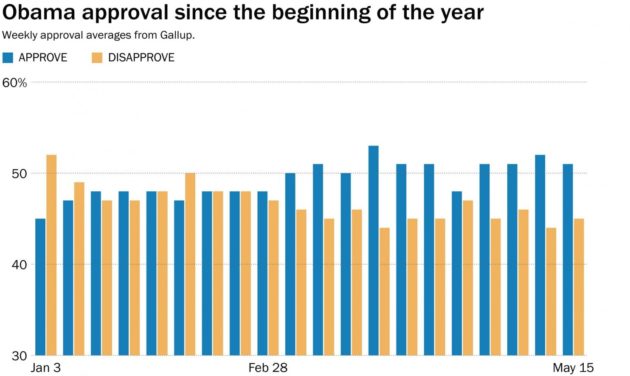Washington Post: “Looking at quarterly averages of Obama’s approval, you can see how stark the improvement has been by party. Democrats have slowly looked at Obama more favorably since the beginning of 2015, but independents have begun to look at Obama much more favorably. After a sharp slide following his reelection, independents turned their opinions of Obama around at the beginning of 2014. Over the past year, that’s escalated. And since ratings from Democrats and Republicans are more stable, that shift by independents moves the needle a lot.”
Dan Balz: “His political instincts are as rash as hers are cautious. Her policy proposals are as detailed and numerous as his are broad and few in numbers. Her public appearances are controlled and careful. His are the political equivalent of The Truman Show. She says he is unqualified to be president. He says she is unfit to serve.”
“There are certainly ideological differences between the two. But this is not an election that presents voters with the kind of choice they had in 2012. President Obama and former Massachusetts governor Mitt Romney had sharply different views about social and cultural issues, the size and scope of government, the best ways to create jobs and projecting U.S. power abroad.”
BuzzFeed on what’s next for Bernie: “Over the last month, Sanders backers have started jockeying for a say in, and piece of, the assets, influence, and energy that has driven the Vermont senator’s rise. A former Sanders adviser, Zack Exley, has co-founded an effort aimed at to coordinating a nationwide slate of progressive House and Senate candidates. A volunteer and longtime organizer, Patrick DeTemple, has circulated a draft proposal urging the candidate to drop out after the June 7 contests and transfer his movement to a new entity. And overlapping groups of current and former aides are discussing who will retain Sanders’ massive email list, the campaign’s most precious asset, and for what kind of project.”
“For all the talk of the future, however, the Sanders legacy remains uncertain, even amid the chaos on display in Nevada last weekend. Those closest to Sanders insist that the senator himself remains focused on the final contests. The question of what’s next, they say, should and will be his alone to answer, how and when he wants to answer it.”
“Bill Clinton’s schedule many days is more packed than Hillary’s, though by design it rarely registers on the national radar,” the Washington Post reports.
“This is the invisi-Bill campaign. The former president who flickers occasionally on cable news channels remains a big draw on the off-Broadway circuit of presidential politics. It is a low-altitude tactical deployment that leaves a light footprint, aiming to maximize his value as a political asset without stirring the negatives that also trail him.”
“His new duties have not come without stumbles, and they conjure the implications of a Clinton restoration. Presidential spouses are expected to exert their influence over china patterns, not China policy. No one, however, is under the illusion that Bill Clinton would remain cloistered in the East Wing. Still open to question is whether voters will welcome his return or worry about it.”
Wall Street Journal: “Ohio, a state that has backed every presidential winner since 1964, presents both Mr. Trump’s best opportunity to carry a big swing state and reveals his team’s steep logistical challenges.”
“After winning the GOP nomination on a tight budget with a skeletal staff, Mr. Trump doesn’t have any general-election staff in the state, and senior aides in New York and Washington haven’t made contact with the state Republican Party. Efforts to recruit the state’s experienced operatives who helped elect Gov. John Kasich have so far been unsuccessful, people familiar with the matter said.”
“Mrs. Clinton has a small team of full-time aides in Ohio, where they are working to rebuild the organization that twice carried the state for President Barack Obama.”
Doyle McManus at the Los Angeles Times says Obama’s pivot to Asia is working:
When President Obama declared in 2011 that he wanted U.S. foreign policy to pivot to Asia, some derided the move as a clumsy attempt to flee the messy conflicts of the Middle East.
But the pivot has actually worked pretty well – as will be evident when Obama travels to Asia this week. Almost every country in the region is clamoring for a closer relationship with the United States.
The most striking case is Vietnam, most of whose leaders are old enough to have fought in their country’s war with the United States. The communist regime has been openly courting a deeper military relationship, and has even invited the U.S. Navy to return to Cam Ranh Bay, its base during much of the war. During his visit, Obama is expected to announce an expansion of American military sales.
Jeet Heer at The New Republic says the race war version of The Apprentice is a disturbing glimpse into Trump’s mind:
Andrew Kaczynski has posted a remarkable audio of a 2005 appearance by Trump on “The Howard Stern Show” in which the presumptive Republican nominee talked about his unsuccessful push for a version of the reality show where the teams would be divided along racial lines. NBC nixed the idea but Trump was still keen on it, despite Stern’s skeptical questioning. “Wouldn’t that set off a racial war?” Stern asked.
Trump had put much thought into his idea. He wanted the white team to be all blonde but the black team to be an “assortment” of blacks of differing skin colors. Racial consciousness and competition is clearly never far from his mind. Although Trump flip-flops on many issues, there are three he’s been consistent on all his life: supporting mercantilist trade wars, upholding gender hierarchy, and racism. If he’s elected, these ideas will play out on a stage far greater than a reality show.
David Atkins at The Washington Monthly says Get Ready for a Long, Very Ugly Election Won on the Ground:
… the way both sides will try to win is not to convince the disaffected that their candidate will affect dramatic positive changes (though Trump may have some disaffected voters with whom he can make that argument; Clinton’s chance of persuading her own version of the same is somewhat less due to her intentionally incrementalist message), but to scare them into believe that the other candidate will make dramatic negative changes.
In other words, Trump will try to convince apathetic conservative that Clinton will turn America into a gun-free Venezuelan socialist despotism, while Clinton will try to convince apathetic liberals that Trump will turn America into an unstable, trigger-happy fascist dictatorship. Clinton will use Trump’s lascivious past against him, even as Trump brings up decades of unsavory personal Clinton associations. It’s going to a very nasty affair. The one big advantage Democrats will have is a probable surge in the Latino vote out of genuine self-preservation.
In the meantime, the election will actually be won not in the air, but on the ground. The ugliness on the air will depress turnout even further, which will require campaign organizers to depend on millions of face-to-face conversations with voters on the fence about whether to vote at all.
All of which is to say this: as we approach the general election, those who want to help their candidate win in November should probably spend a lot less time arguing with other people in online forums or obsessing over television ads, and a lot more time making calls and knocking on doors. That’s where this very ugly game is going to be won and lost.
Jonathan Chait on Why Democrats Have Popular Presidents and Republicans Don’t:
As the matchup between Donald Trump and Hillary Clinton takes shape, it has begun to dawn on some conservatives that the Republican Party faces a distinct handicap: The Democrats will have two popular ex-presidents to campaign for them, and the GOP will have none. Bill Clinton is the party’s most effective surrogate for wife Hillary, writes Byron York in the conservative Washington Examiner: “Republicans haven’t had the same luck. The only two-term GOP president in the last generation, George W. Bush, has stayed mostly out of politics in the seven years since he left the White House.” Meanwhile, writing for The Wall Street Journal opinion page, Richard Benedetto grapples with President Obama’s value as a surrogate. “When Mr. Obama ran for office in 2008, a central part of his campaign strategy was to heap blame on George W. Bush,” writes Benedetto. “How has Mr. Obama dodged similar treatment?”
How indeed? The answer, I’d suggest, is something along the lines of by governing competently rather than presiding over a flaming wreck of a presidency. But this answer presumes a level of introspection into the success of the last two Democratic presidents, and the conspicuous failure of the one wedged between them, that is absent from both columns, and from conservative thought in general.
Ed Kilgore says soon it will suck to be Donald Trump:
Throughout the pre-primary and primary phases of the GOP presidential-nominating process, Trump had a bunch of advantages he will soon lose. He was a novice pol who was regularly defying expectations amidst almost universal predictions of failure. He was the dominant media object in a very crowded field of opponents. He had the strategic flexibility associated with doing relatively well in every region of the country and among every major category of Republican voter. He was independent of any sizable bloc of endorsers, donors, or surrogates, operating from his own tight-knit personal army. He was functioning within a Republican Party dominated by the older white voters that were his principal base, and where the minority voters he so deeply offends were rare and insignificant presences.
Now he is about to become the Titular Head of the Republican Party, with presumed responsibility for a big, divided and (at the moment) fearful coalition of down-ballot candidates and allied constituency and interest groups. Even if he minimizes the value of party support, he’ll have to deal with constant advice and admonitions from party officials, many of whom not-so-secretly would prefer that he lose and leave them to inherit the GOP. He’s already beginning to hustle money to finance his campaign.
Given the binary nature of general elections, he can no longer count on the kind of huge margins in media coverage he enjoyed when it was 16 Lilliputians trying to overcome the orange-haired Gulliver. For that matter, in Hillary Clinton he will finally face an opponent as well known as he is. He will not be able to run a national campaign that divides and conquers a scattered and regionally dependent opposition. He’ll be fighting Clinton one-on-one in the same fixed set of battlefield states. Instead of dealing with an electorate where he can find support all across demographic groups, Trump will be beginning in a deep, deep hole with African-Americans, Latinos, and professional women, with sure support only from groups like non-college-educated conservative white men, which any Republican can and must carry by huge margins.
At key moments in the campaign like the debates, Trump will no longer be addressing an audience that inherently hates “political correctness” and thus has a high tolerance for borderline racist and sexist rhetoric and insult-comedy. And Clinton and her allies will be able deploy their massive oppo-research files on Trump in a consistent, relentless manner very much unlike the occasional, clumsy, and halfhearted Trump-bashing undertaken by his primary opponents and the mainstream media. After all, it’s not like Democrats need to treat him with kid gloves because they’ll need to appeal to his core supporters down the road.

